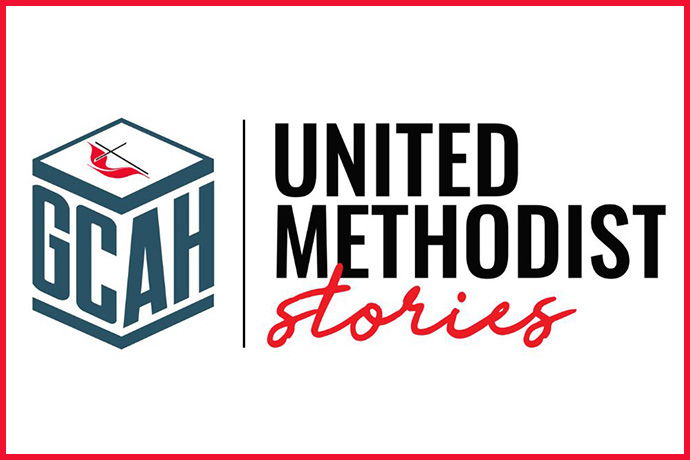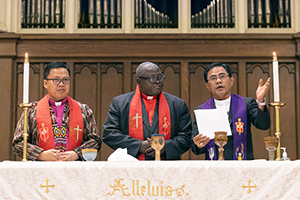
Key points:
- Developed by the Commission on Archives and History, the United Methodist Stories app was unveiled at General Conference, and it’s expected to be available soon to everyone who wants to share stories about the denominational experience.
- The focus for now is promoting the collection of stories, and contributors can be frank because the information won’t become public for 25 years.
- Contributors will also have the option of having their stories made immediately available.
Selected participants at General Conference are recording their impressions for posterity, using a new app soon to be available to all United Methodists.
The United Methodist Stories app was developed by the United Methodist Commission on Archives and History and was announced April 29 at a General Conference press conference. It will be available only on mobile devices.
“Preserving testimonies and reactions from a variety of voices to major events within The United Methodist Church will serve as a vital learning tool for our denomination’s future, as well as interrupt the dominant, often colonial, understanding that history is preserved only through written form,” said Ashley Boggan D., top executive of Archives and History.
The app has been tested at a few events already, including the 40th anniversary convocation of Reconciling Ministries Network in October.
“It will be in the app stores once we get back from General Conference and make sure that everything worked,” Boggan said.
Using the free app, users will be able to record, review and submit their impressions of events such as General Conference. The recordings will be added to the reository of the app, which will eventually be available to all.
“When we look at our historic record, General Conference and the politics around General Conference and the planning and the strategy, a lot of that was written down through correspondence,” Boggan said. “We don’t really write letters so much anymore, so this is a way for us to capture some of the strategy.”
The Rev. Molly Vetter, senior pastor of Westwood United Methodist Church in Los Angeles, is recording her impressions of General Conference on the app. She said it was easy to use.
“I have found it satisfying to help capture some of the story of what’s happening at General Conference that doesn’t make it into the plenary minutes or the official actions,” Vetter said.

The United Methodist Stories app was developed by Kevin Dusenberry, the digital archivist for Archives and History.
“(Dusenberry) is a great innovator and thinker,” Boggan said. “I asked him if it was possible to create some sort of easier way for persons to record their stories, their testimonies, their calls to ministry, their witnessing of mission, that was relatively accessible.
“And he said, ‘Of course,’ and then he proceeded to write all of the code for this app.”
Subscribe to our
e-newsletter
The priorities were “usability and accessibility,” said Dusenberry, who is based in New Jersey, in an interview.
It’s anticipated that various United Methodist groups including conferences, congregations, agencies and ethnic caucuses, may eventually come to Archives and History for customized platforms.
“So at your annual conference, if you want to ask your laypersons, your clergy, your seminarians, anyone in attendance, a certain question to reflect on that week, we could design the app to have that question,” Boggan said.
She added the app will be used to help collect and preserve the stories of persons in their native tongues and persons whose cultural context isn’t prone to predominantly a written narrative.
“So this will be open to doing and capturing oral histories so that we aren’t just relying so heavily upon a written narrative, which tends to be a Western white narrative,” Boggan said.
The immediate focus will be on collecting stories, rather than dispensing them. There will be a 25-year wait before most data will be publicly available — in hopes of encouraging frankness. However, users will have the option to make their contributions available immediately.
“It’s a pretty standard archival policy,” Dusenberry said. “We want to encourage people to confront tough topics, and how they dealt with it, or how their church community dealt with it. And this gives them a little bit more freedom to speak.”
The database will be browsable, he said.

General Conference photos
Dusenberry said a lot of this technology is coming through Amazon Web Services.
“We’re going to be working to integrate automatic transcription and translation on the back end, so we can make these stories available to even more people,” he said.
The transcription process would identify personal identification information for possible deletion so users can feel safe. There will be a countdown clock to help contributors keep their reflections to the point, but no one will be cut off if they keep talking past 30, or even 60 minutes.
Patterson is a UM News reporter in Nashville, Tennessee. Contact him at 615-742-5470 or newsdesk@umcom.org. To read more United Methodist news, subscribe to the free Daily or Weekly Digests.



